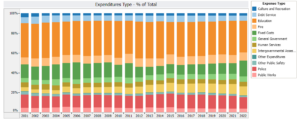Boston’s Budget: Wu and City Council Debate
In April, Boston Mayor Michelle Wu unveiled a proposed FY24 $4.28 billion operating budget for the city, her second since taking office in 2021. The budget has been bouncing back and forth between Wu and the City Council, with disputes over funding for several key departments, including the Police Department and the Public Library. Wu’s original budget was intended to streamline some city agencies and departments, as well as to emphasize supporting families.
This blog will go over details of the budget, as well as the points of contention in it, such as proposed cuts to the police department and veteran services.
Details
The latest budget proposal is up $274 million, or 6.8 percent, from the 2023 operating budget, with 31 percent of that extra funding going toward public schooling, including charter schools. In a letter to city councilors, Mayor Wu has argued that Boston can increase its spending by that margin because of its strong bond ratings stemming from stable financial management.

Boston Expenditures by Type, 2001-2022
Source: MassAnalysis
Wu wants Boston “to be first for families anywhere across the country”, and she is showing it by putting $4 million to the city’s pre-K program and designating $500,000 each to youth swimming lessons and training for life science jobs. Aside from supporting families, Wu’s other four budget banners are “supporting a green and growing city, ensuring public health and safety, closing the racial wealth gap and delivering exceptional city services”, according to GBH.
Wu’s family-friendly approach is spearheaded by the increase in education spending, which has historically been Boston’s largest expense. According to MassAnalysis, Boston in 2022 spent over $1.1 billion on education, making up around 32 percent of its total expenses. Surprisingly, education spending accounted for a lower percentage of overall expenditures in 2022 than at any point in the 21st century. It’s usually around 35 percent, showing how much education has dominated Boston budgets.

Boston Expenditures Type – % of Total, 2001-2022
Source: MassAnalysis
Wu vs. City Council
Recently, there has been some contention between Wu and the City Council, surrounding the Boston Police Department and veterans services. Councilors voted 7-5 in favor of a new operating budget that included $53 million in amendments that cut $31 million from the police and $900,000 from veteran services.
Wu rejected the proposal, and commented that the police cuts were “illusory,” as the city is “obligated to cover salary and overtime expenses incurred by the department.” Essentially, cutting the police budget is ineffective, as the city is still required to pay department salary and overtime expenses regardless of the budget. The Boston Police Department has consistently made up a good chunk of the city’s expenses, costing the city over $416 million in 2022, or around 12 percent of total expenditures. Yet, crime in Boston has been on a steady decline since 2004, according to MassAnalysis.

Boston Crimes, 2004-2021 Source: MassAnalysis
Takeaways
The budget process for Wu and the City Council will continue to drag on, as the council is expected to go over the budget again on June 28th. This back and forth is not new, as last year councilors passed $26 million in amendments, including another attempt to slim down the police budget. Overall, the new budget will end up supporting education and families, but the City Council’s plans for cuts in the police department and other areas will likely fizzle out.
About the Author:
Teddy Wynn is a Roger Perry government transparency intern with the Pioneer Institute. He recently graduated from Hamilton College, earning a Bachelor’s degree in World Politics. Feel free to reach out via email, Linkedin, or write a letter to Pioneer’s Office in Boston.



